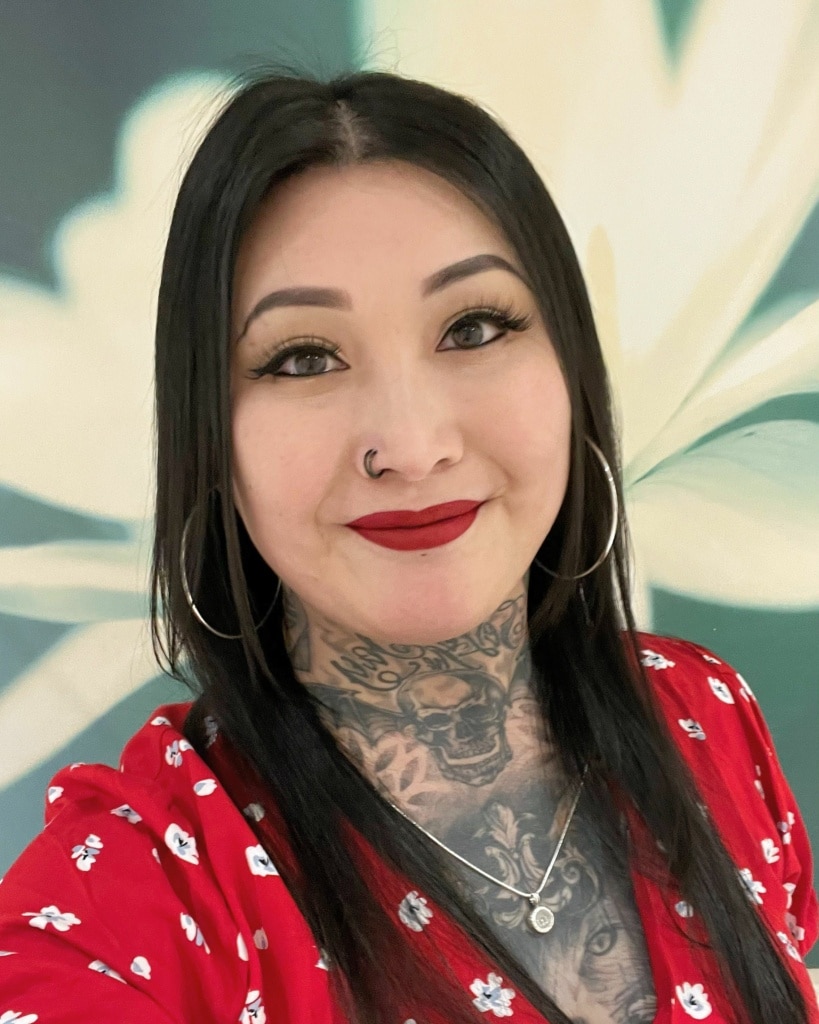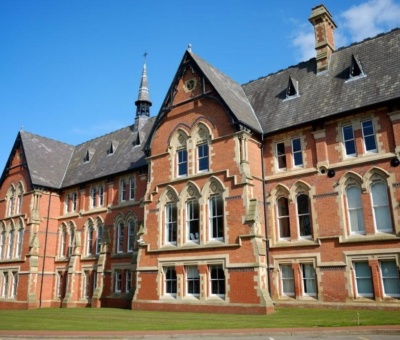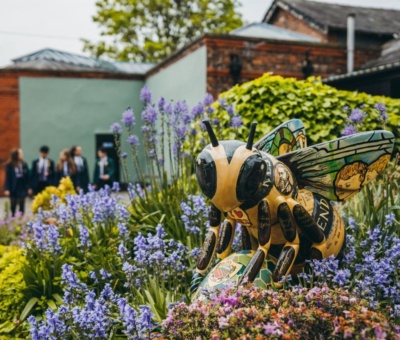Square peg, round hole – Eva Echo (Class of 1998)
Eva Echo, Class of 1998, is an activist, ambassador, blogger, educator, and public speaker. She is the Head of Communications & Engagement at Birmingham Pride, an LSIP member of the Crown Prosecution Service, a brand ambassador for London Transgender Clinic, and a representative of CC3 Entertainment and MS Represents. We were delighted to speak to Eva for the most recent edition of our Old Waconian Magazine, and present the full interview here.
TRIGGER WARNING: This article discusses sensitive topics such as mental health and suicide.
What was your understanding of gender identity at school, and how did it impact your experience?
In fairness, gender identity has only recently started to be discussed. But my understanding at the time was limited; it wasn’t something that was ever mentioned, and it wasn’t a subject area in school. I just felt… wrong. Being bullied really didn’t help either.
I became ashamed of being intersectional and just withdrew. I told myself that nobody wanted to be my friend because of who I was and that I should just keep to myself. I remember sitting in class and not understanding topics, but being too afraid to put my hand up. I used to dread being picked out by a teacher to give an answer. I was at school to learn, but the culture meant I struggled to do so. I was so paranoid that people were watching or mocking me. I felt so incredibly isolated and alone, even though I had a handful of friends.

Puberty was also a really difficult time for me. I knew it was beyond my control, yet I didn’t want to accept it. I think that’s when my problems went from bad to worse. It would have been amazing to be able to speak to someone about it, but nobody seemed approachable. And even then, what would I say? I just floated along, wishing the days away, hoping that things would be better once I’d left school.
But there were good times too. My favourite class was art – it was the only time I could enjoy any sort of expression. I’ll forever be grateful to Mr Yearsley for giving me that chance.
Tell us about your struggles with gender identity and how it has influenced your work as an activist.
I’ve felt different since I was around the age of four or five. I didn’t want to be like the other boys at school, but I didn’t know how to articulate the feeling. I just pushed them away every time they would try to surface. This went on for years – even into adulthood. I never realised that it would have such a detrimental impact on my mental health, but I had spent most of my life trying to be who the world told me I needed to be. I was playing a role – one that would end with me trying to take my own life or self-harm.
I would wake up in hospital, get discharged, then pick myself up and try playing a different role, hoping that the next one would be for me. Deep down, I knew it wasn’t going to work. I developed an eating disorder. I abused alcohol and prescription painkillers. I never looked both ways when I crossed the road. The ongoing internal conflict meant I didn’t care what happened to me. I even put an expiry date on myself because I was convinced nobody would understand me – let alone accept me.
It wasn’t until I started to document my journey in my blog that I realised I wasn’t the only one experiencing these feelings. When people from around the world started to read my words and reach out, I knew something wasn’t right.
After I came out, I realised that was just the beginning of our collective struggles. Coming out is meant to be a time of liberation – when we can finally stop pretending or playing those different roles, and just be who we are. That euphoria was short-lived, though, when I was faced with a lengthy wait on the NHS for an appointment at a gender clinic – and the fact that I had to look over my shoulder every time I was out in public in the meantime.
It’s this realisation – and not wanting future generations to have to go through what I, and thousands of others, went through – that keeps me going in the fight for inclusion and acceptance. Even when the media is attacking from all angles and transphobes are trolling us with death threats, I know nothing compares to the feeling of being outcast and incomplete. I’m in a much better place now and I’m fortunate to have what I have, but there’s no liberation until the entire community is liberated.
What has been your greatest achievement or proudest moment while working with organisations like Birmingham Pride, We Create Space and Gendered Intelligence?
I’ve done so much with each organisation that I couldn’t possibly single one thing out.
I’ve recently taken NHS England to the High Court for a Judicial Review over its unlawful waiting times for trans patients. I’ve created a campaign to raise awareness of trans and non-binary issues. I’ve helped to raise awareness and implement change within the national cancer-screening service to be more inclusive of trans people. I’ve also helped individuals to just feel like they’re enough.
But my proudest moment so far has to be being listed on DIVA Magazine’s prestigious Power List for 2022 and then receiving the DIVA Award for Unsung Hero of the Year. I only say that because it encapsulates all the areas I work in, and the things I’ve done up until this point.
Working with different organisations and being involved in so many projects has given me the ability to recognise my own privilege and platform, and to see the bigger picture. As a community, we face struggles in nearly every single aspect of life – from homelessness to mental health, to accessing trans healthcare, to hate crime, to employment, and even media representation. It’s a struggle just to exist.
Of course, nobody sets out to be an activist – let alone win anything for it. There’s still so much to be done, and even without an award, I’ll still be out there trying to create positive change. I’m trying to be the person I never had when I was growing up whilst being my own kind of beautiful.
What has been your greatest challenge as a member of the Crown Prosecution Service?
I’m involved in reviewing previous cases, from the initial police report to the subsequent conviction. It allows me to offer an insight through my own lens, and to challenge the criminal justice system to ensure that any mistakes are fed back and that recommendations for change are put forward. I soon found there’s another level to dealing with hate crime and the criminal justice system.
There are deep-rooted issues between the LGBTQ+ community and the police. This dates back to the Stonewall riots in 1969 – exacerbated by legislation such as Section 28. The biggest challenge for me is helping to bring the two sides together. I can recommend changes and hold parts of the criminal justice system to account, but it means nothing if the community doesn’t trust or even report to the police in the first place.
I know there’s no quick fix for the animosity and that I’m not likely to see the benefit of change in my own lifetime, but I am determined to try. Both sides must come together to acknowledge the past and to heal before we can move forward. It can be frustrating, and at times I get hate from within the community for even working with the CPS and the police, but I’m too stubborn to let hate win!
How do you think schools can support students and alumni in their own journeys?
It’s important that schools allow students to lead when it comes to sexuality and gender identity. The individual knows who they are and what they need better than anybody else. But they can also help create safe spaces for awareness, offer education and ensure representation. That will create a culture of acceptance amongst the next generation.
And finally, we couldn’t resist asking… What is it like to be a world record holder?
Haha! I sometimes forget that I’m a Guinness World Record holder! I even forget I used to be a drummer – that’s how much my life has changed since coming out five years ago! I was awarded my GWR for taking part in the world’s largest full drum ensemble.
I was so proud of the achievement, but looking back, I think it lacked meaning. Yes, we raised a lot of money for charity by doing the event, but I think I approached it hoping it would fill a gap in my life. That achievement has now been superseded by what I do now. It’s so much more rewarding as I can see the difference it’s making to people’s lives.
My community needs me more than music does. If anything, my GWR has become something I use as an icebreaker or to show others that trans people – whether they’re out or not – are just people too.
Click here to view Eva’s online portfolio.


